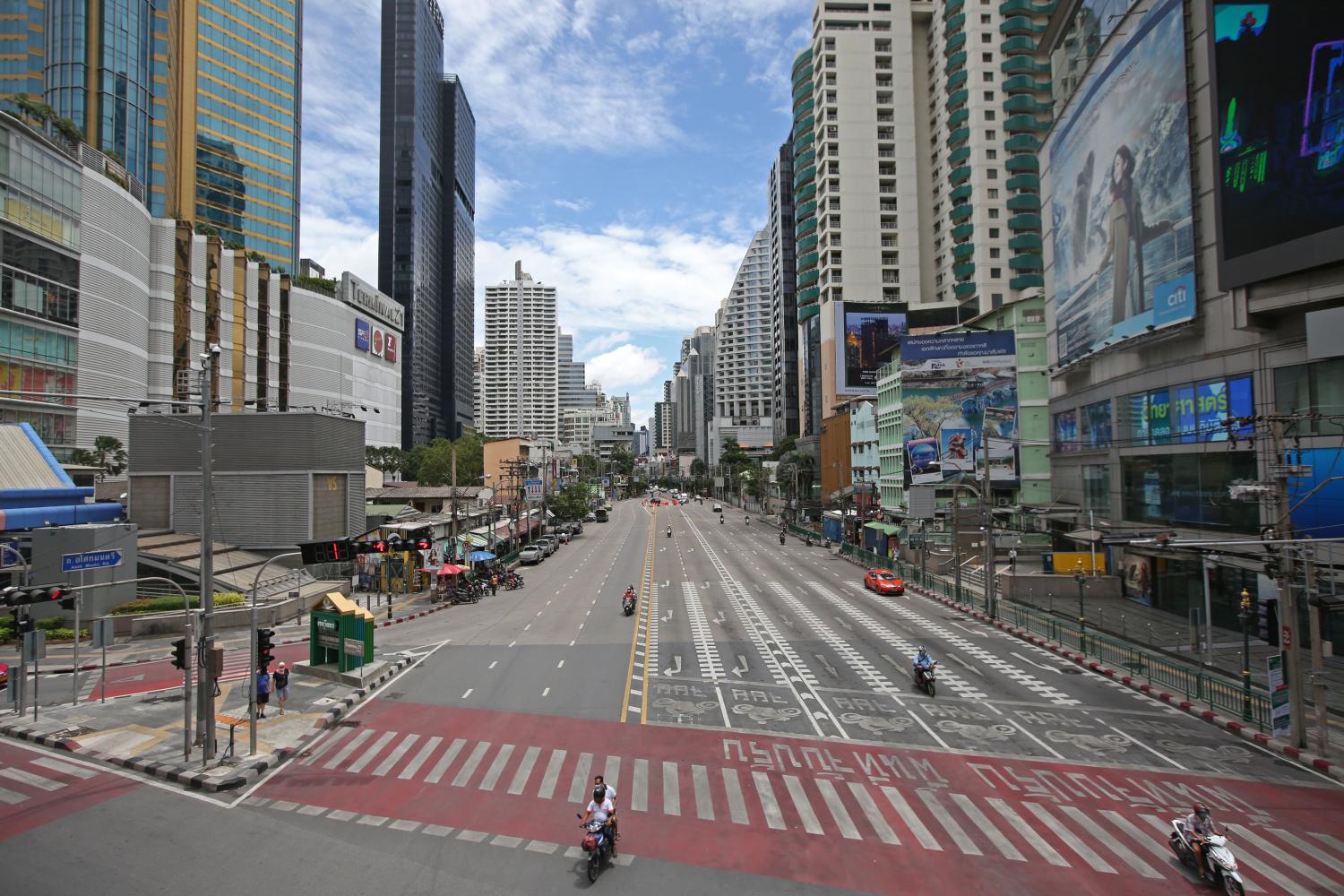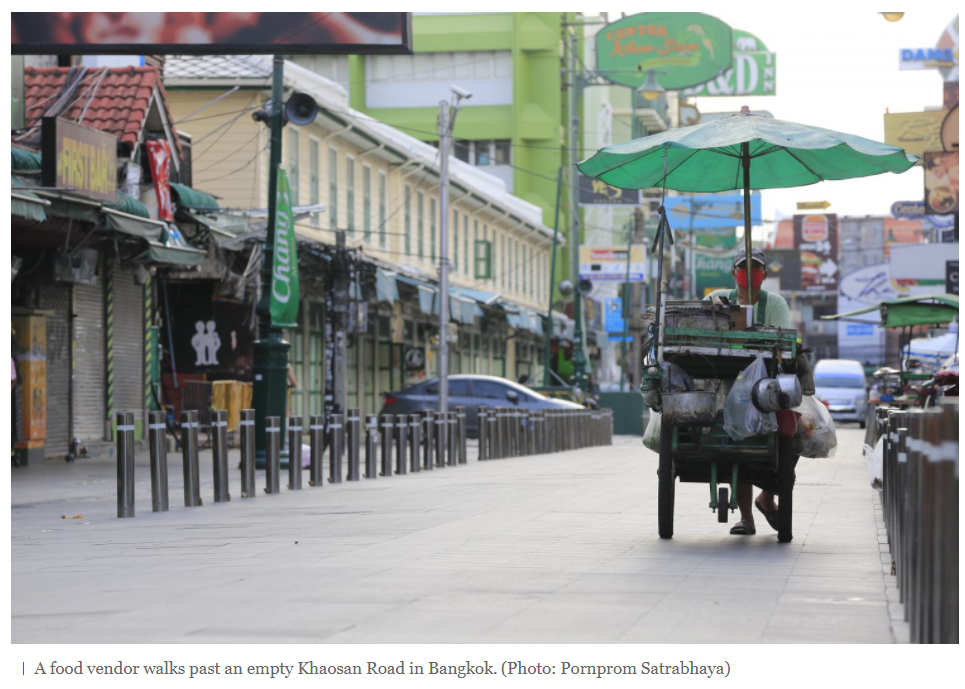Thailand: Hungry for an injection
The Covid-19 pandemic has put the Thai government in a bind, having to choose between saving lives and protecting their livelihoods.
Since March last year, Thailand has announced several economic stimulus packages in phases, covering cash handouts to severely affected persons, farmers, vulnerable groups and welfare cardholders; domestic tourism promotion; personal income tax reduction; employment subsidies; debt restructuring programmes; and soft loans to small businesses.
Funding for these packages came from both from the government’s fiscal budget expenditure and borrowing.
The government approved a 1-trillion-baht emergency loan decree in April last year, part of a package of economic measures worth 1.9 trillion baht to alleviate the impact of the coronavirus outbreak.
In May of 2021, the government approved an executive decree to borrow an additional 500 billion baht to fight Covid-19.
On Monday last week, the Bank of Thailand urged the government to borrow an additional 1 trillion baht, roughly 7% of the country’s GDP, to address the severe economic impact of the pandemic and improve the country’s long-term growth prospects. Such a move would increase the country’s public debt ratio to 70% of GDP by 2024.
Finance Minister Arkhom Termpittayapaisith announced on Thursday there is no need for the government to borrow additional money to combat the pandemic because the existing 500-billion-baht loan is sufficient.
While the government ponders any new borrowing, the business sector believes it is imperative to think about the effectiveness of such enormous spending plans.
EFFICIENT SPENDING
Somchai Lertsutiwong, chief executive of Advanced Info Service (AIS), the country’s largest mobile operator by subscribers, said it is vital the government has a clear action plan on how to use a 1-trillion-baht loan if such an amount is sought.
This requires an efficient spending plan, he said.
Seeking the loan is not a concern as long as it will be used to shore up economic and social sentiment during this difficult time, said Mr Somchai.
He said the government must focus on three tasks during this crisis: clarifying the vaccination programme, effective diagnosis and classification of patients according to the severity of their health conditions, and assistance measures.
As the government has dealt with the pandemic for more than a year, it should already have enough data about the level of impact on businesses and the labour sector, said Mr Somchai.
Small and medium-sized enterprises (SMEs) are likely to be the most affected by the pandemic, he said.
“The state should categorise them according to the level of impact and help businesses with fair remedy measures, such as the co-payment scheme, which can help ease their expenditure burden during the lockdown,” Mr Somchai said.
Some people have cheated to qualify for assistance schemes and the state must hand out severe punishment, he said.
“People do not see a clear record of how government loans have addressed problems. Many hospitals still lack a sufficient budget to deal with the pandemic,” said Mr Somchai.
“Any assistance measures may have loopholes, but the government must have a clear action plan and execute it. It is vital to update and explain necessary information to the public when problems are found.”

‘Permanently closed’ signs are displayed on stalls at Bang Kapi fresh market after a Covid-19 outbreak. Varuth Hirunyatheb
LOOSEN THE PURSE STRINGS
Sanan Angubolkul, chairman of the Thai Chamber of Commerce, said now is a critical time for all business sectors.
The chamber estimates the economy has lost at least 800 billion baht in damage from the pandemic year-to-date and the total will exceed 1 trillion baht for 2021.
The chamber proposed the government consider expediting the use of approved loans and plan for additional loans to heal the economy.
“The Bank of Thailand proposal of emergency loans worth 1 trillion baht is consistent with previous chamber proposals to the government and is a reasonable response to current economic problems,” he said.
“It is necessary to accelerate economic restoration and stimulus because if we do not take any action, there will be enormous damage. If both small and large businesses have to close down permanently, it will affect the labour sector as well as millions of people in the country.
“By that time, the cost to the country would be tremendous and no one wants that to happen. If additional borrowing is needed, the plan must be clear, direct, transparent and quickly executed to truly help restore the economy.”
The chamber already proposed the government inject at least 500 billion baht into the economy in the fourth quarter this year to increase consumer purchasing power, especially for businesses unable to survive, said Mr Sanan.
He said the measures must be accessible, convenient and uncomplicated to quickly put the money in the hands of people.
“In the first half of 2022, the chamber proposed an additional 500-billion-baht injection to restore the economy,” said Mr Sanan.
“By that time, we hope at least 70% of the Thai population has received the first dose of a Covid vaccine, which should speed up economic activities, leading to signs of an economic recovery. New lending is necessary to support the economy and make it more resilient to reach its full potential.”

A parking lot in Charan Sanitwong Soi 13 is packed with taxis owned by two cooperatives that claim about 2,000 cars have been returned by drivers who cannot afford the rental fees, despite recent reductions. Nutthawat Wicheanbut
MORE IS BETTER
The Federation of Thai Industries (FTI) welcomes the central bank’s proposal of another 1 trillion baht in borrowing, and even views the amount as “insufficient” to restore the severely damaged economy, said FTI vice-chairman Kriengkrai Thiennukul.
The value should be increased to at least 1.5 trillion baht, he said, though the government must ensure wise spending of the loan by injecting money at the right time.
Thailand badly needs more fiscal injections after the three Covid-19 outbreaks caused the government to resort to lockdown measures to contain the spread, at a huge cost to the economy, said Mr Kriengkrai.
The FTI’s demand for more loans is in line with the Joint Standing Committee on Commerce, Industry and Banking, which earlier suggested the government borrow 2 trillion baht.
He played down any concerns that more lending will exceed the public debt ceiling, currently fixed at 60% of GDP.
During this economic crisis, Thailand needs to borrow more money and the ceiling can be increased to 70%, said Mr Kriengkrai.
The government must also carefully plan its money distribution, he said. It is useless to inject money while drastic lockdown measures remain in place because it will not effectively stimulate economic activities, said Mr Kriengkrai.
The government should gradually inject the money and keep the spending in line with the number of vaccinated people, he said.
Authorities should spend a portion of the loan when 30% of the population is inoculated and make a full injection when the 70% mass vaccination target is achieved, said Mr Kriengkrai.
“The central bank must have seen the whole economic picture before it urged the government to borrow more and suggested ways to increase revenue,” he said.
The central bank suggested the government increase the value-added tax by one percentage point, which is expected to increase state revenue by 60 billion baht a month.
The suggested tax should only be enforced after the Thai economy recovers, said Mr Kriengkrai.
FTI chairman Supant Mongkolsuthree thinks it will not be easy for additional government borrowing when past and current interest rates are taken into consideration.
“The timing of the loans is crucial. The interest rate has begun to increase. This will be a difficult decision for the government,” he said.

Medicine and public health comprise a significant portion of the 1 trillion Baht fund allocated to fight the Covid-19 pandemic. Somchai Poomlard
GOOD PROTECTION
If the government decides to seek an additional 1-trillion-baht loan for economic rehabilitation, it must stockpile high-quality vaccines and antigen test kits to end the current outbreak, said Chamnan Srisawat, president of the Tourism Council of Thailand.
The dispute regarding test kit procurement needs to be rectified to ensure quality test kits are distributed to people to allow self-testing, and hopefully those who test positive will seek medical treatment before spreading the virus to others, he said.
The ability to control the virus will increase opportunities to reopen tourist destinations as well as restore the travel confidence of both international and domestic tourists, said Mr Chamnan.
“Vaccination is the sole solution for combatting the virus and allowing tourism to restart,” he said.
“Instead of offering individual financial aid during lockdown, which cannot make up for financial losses, tourism operators would like to restart their businesses with a consistent flow of tourists once it is safe to travel.”
A portion of the 1-trillion-baht budget should be allocated for financial support for tourism operators via the 10-billion-baht fund to restore operations after most businesses in the sector struggled to survive during the pandemic, said Mr Chamnan.
He said tourism has been the hardest-hit industry for almost two years, but there is no concrete or accessible financial measure for SMEs in this sector from the government.
SMEs entrepreneurs can only access the tourism fund under a cross-guarantee mechanism, meaning the companies act as loan guarantors for each other.
Moreover, budget gearing for effective and continuous domestic tourism stimulus projects is necessary to drive local sentiment, said Mr Chamnan. Such measures will support operators’ long-term recovery while they await international travel to fully resume, he said.
Mr Chamnan said tourism operators should be consulted when creating any stimulus campaign to ensure the schemes are worth the budget and can successfully boost domestic trips.

People wait in a long queue for their first vaccination against Covid-19 at a shopping mall. Varuth Hirunyatheb
SITUATION DEPENDENT
Nonarit Bisonyabut, research fellow at Thailand Development Research Institute, thinks additional government borrowing should depend on the scenario.
If the pandemic is controlled in Thailand by the end of this year and the country reaches herd immunity, the government is likely to need a budget to assist workers in the informal and formal sectors for around three months, paying them 5,000 baht per month, he said.
In this scenario, the government would need 300-400 billion baht and could use funds from the existing 500-billion-baht decree earlier this year, making additional borrowing unnecessary, said Mr Nonarit.
If the outbreak is not controlled until the first quarter of 2022, the government might need to pay workers in the informal and formal sectors 5,000 baht per month for six months. This scenario would necessitate a budget of 600-700 billion baht, requiring more government borrowing, he said.
Mr Nonarit suggested the central bank provide direct soft loans to businesses and take the risk on itself, instead of lending via banks as happens now. He said this is because commercial banks are providing loans to borrowers on a selective basis to avoid the risk of bad debt, even if they are instructed otherwise.
The Bank of Thailand could also use branches of state-run banks to allow businesses to apply for direct loan.
Mr Nonarit said while the central bank might be restricted by its rules from providing direct loans to borrowers, an emergency decree could enable direct loan provision.

Asoke junction in Bangkok is unusually void of traffic during the Covid-19 pandemic. Varuth Hirunyatheb


 English
English







